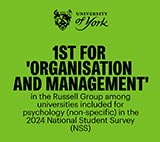
Educational psychology and teaching
In the past, it was a requirement that you had to train and work as a teacher before you could begin training as an Educational Psychologist. You don’t have to do this now, but you will still need to gain lots of relevant work experience with children (the 3-19 age range), in an educational setting. There is a very limited number of training places available each year so competition is intense. Volunteering is good, but you will also need evidence of substantial, relevant paid employment. Teaching is obviously one way to get this experience, but you could also find it through spending time in an educational environment in other ways, for example as a classroom assistant, learning support assistant or mentor.
To get into these types of jobs you will need to demonstrate experience of working with children during your degree and both classroom and non-classroom based experience is relevant. For educational psychology it is really helpful if you can gain work experience with children who have special educational needs (physical disabilities, learning disabilities, emotional/behavioural problems).
The information below will give you an overview of what kind of work experience is relevant. See also suggestions on the Careers and Placements website:
School based experience
The best way to gain work experience in schools is through the University’s York Students in Schools (YSIS) programme where you can work for ½ day a week as an assistant in a local school. Arranging a placement can take a little time as the schemes operate on a semester basis and you need to obtain a DBS check, so the earlier you start the better!
You can also approach schools in your home area for the possibility of some work experience during University vacations.
Education Related
Students also gain experience of working with children in other ways, such as Student Ambassador work, play schemes, youth clubs, Cub Scouts and Brownies. Some of these opportunities are offered through the university, some you will need to arrange for yourself (see links above for information).
Consider volunteering opportunities offered via Careers and Placements. Many of these will offer relevant experience with children and young people; check particularly opportunities in Health and wellbeing, Young people, and Museums and the Arts for education-related projects.
Other opportunities
- University of York Students' Union has a number of ongoing volunteering projects that involve working with children and young people.
- Working as a Counsellor in American Summer Camps with organisations such as Bunac or Camp America
After graduation
Apply for a PGCE course in your final year or explore alternative ways to train as a teacher such as Schools Direct and Teach First. For Primary PGCE courses the deadline for applications is 1st December in the year prior to entry.
If you need to gain classroom based experience after graduating then you should look out for jobs as a Classroom Assistant, Learning Support Assistant or Learning Mentor. These are usually advertised in local press and on local authority vacancy listings. The Times Education Supplement also advertises vacancies.
Some residential special schools, such as Lord Treloar, offer 1 year posts for graduates who are planning careers in education and social care related roles to assist with learning support and residential activities. Sometimes these are advertised in newspapers such as the Guardian. You can also search for special schools on a dedicated website for speculative applications and advertised job vacancies.
See the Association of Educational Psychologists website for information on applying for training.
